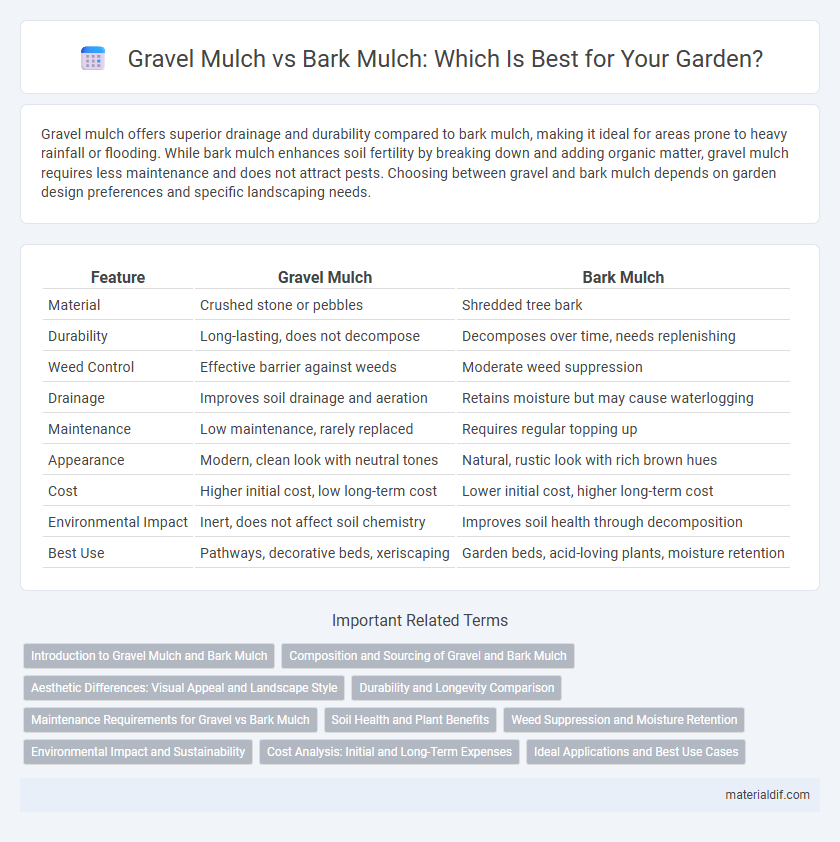Gravel mulch offers superior drainage and durability compared to bark mulch, making it ideal for areas prone to heavy rainfall or flooding. While bark mulch enhances soil fertility by breaking down and adding organic matter, gravel mulch requires less maintenance and does not attract pests. Choosing between gravel and bark mulch depends on garden design preferences and specific landscaping needs.
Table of Comparison
| Feature | Gravel Mulch | Bark Mulch |
|---|---|---|
| Material | Crushed stone or pebbles | Shredded tree bark |
| Durability | Long-lasting, does not decompose | Decomposes over time, needs replenishing |
| Weed Control | Effective barrier against weeds | Moderate weed suppression |
| Drainage | Improves soil drainage and aeration | Retains moisture but may cause waterlogging |
| Maintenance | Low maintenance, rarely replaced | Requires regular topping up |
| Appearance | Modern, clean look with neutral tones | Natural, rustic look with rich brown hues |
| Cost | Higher initial cost, low long-term cost | Lower initial cost, higher long-term cost |
| Environmental Impact | Inert, does not affect soil chemistry | Improves soil health through decomposition |
| Best Use | Pathways, decorative beds, xeriscaping | Garden beds, acid-loving plants, moisture retention |
Introduction to Gravel Mulch and Bark Mulch
Gravel mulch consists of small stones that provide excellent drainage and durability, making it ideal for pathways and areas prone to water accumulation. Bark mulch, derived from tree bark, enhances soil moisture retention and adds organic nutrients as it decomposes, promoting healthier plant growth. Both mulches offer unique benefits depending on landscape needs, with gravel emphasizing structure and bark focusing on soil enrichment.
Composition and Sourcing of Gravel and Bark Mulch
Gravel mulch consists primarily of small, natural stone fragments such as granite, limestone, or river rock, often sourced from quarries or riverbeds, providing durability and excellent drainage. Bark mulch is composed of shredded or chipped tree bark, typically from pine, cedar, or hardwood trees, sourced from sawmills or forestry operations, offering organic matter that enriches soil as it decomposes. The inorganic nature of gravel mulch contrasts with the organic, nutrient-releasing properties of bark mulch, impacting long-term soil health and moisture retention.
Aesthetic Differences: Visual Appeal and Landscape Style
Gravel mulch offers a modern, clean aesthetic with its sleek and uniform texture, enhancing contemporary and minimalist landscape designs. In contrast, bark mulch provides a natural, rustic look with its varied shapes and earthy tones, ideal for traditional and woodland garden settings. Both materials influence the visual appeal by complementing different landscape styles and plantings, where gravel emphasizes structure while bark promotes organic warmth.
Durability and Longevity Comparison
Gravel mulch outperforms bark mulch in terms of durability, with stones maintaining their structure and appearance for decades without significant decomposition. Bark mulch tends to break down within one to two years, requiring frequent replenishment to sustain its protective and aesthetic functions. The longevity of gravel mulch makes it a cost-effective, low-maintenance option for long-term landscaping solutions.
Maintenance Requirements for Gravel vs Bark Mulch
Gravel mulch requires minimal maintenance as it does not decompose, eliminating the need for frequent replenishing, and it allows for better drainage and weed control when used with a proper weed barrier. Bark mulch, while enhancing soil moisture retention and nutrient content, decomposes over time and necessitates regular replacement to maintain its effectiveness and appearance. Choosing between gravel and bark mulch hinges on balancing long-term upkeep with soil health benefits in landscaping projects.
Soil Health and Plant Benefits
Gravel mulch enhances soil drainage and reduces erosion but lacks organic matter essential for improving soil fertility and microbial activity. Bark mulch contributes to soil health by enriching the soil with nutrients as it decomposes, promoting beneficial microorganisms and moisture retention. Plants benefit from bark mulch through improved nutrient availability and root protection, whereas gravel mulch primarily aids in weed control and temperature regulation.
Weed Suppression and Moisture Retention
Gravel mulch provides excellent weed suppression by creating a dense barrier that blocks sunlight from reaching weed seeds, reducing their ability to germinate. It also offers superior moisture retention by allowing water to penetrate slowly while minimizing evaporation from the soil surface. Bark mulch, while effective at retaining moisture due to its organic composition, tends to break down faster and requires more frequent replacement to maintain weed control.
Environmental Impact and Sustainability
Gravel mulch offers superior durability and reduces soil erosion without decomposing, minimizing the need for frequent replacement and lowering environmental waste compared to bark mulch. Bark mulch supports soil fertility by decomposing and enriching the soil but requires sustainable sourcing practices to prevent deforestation and habitat loss. Choosing gravel mulch can conserve natural resources and reduce carbon emissions associated with harvesting and transporting organic mulches.
Cost Analysis: Initial and Long-Term Expenses
Gravel mulch requires a higher initial investment compared to bark mulch due to the cost of purchasing and transporting stones. Over time, gravel mulch proves more cost-effective as it does not decompose and requires minimal replacement, unlike bark mulch which needs regular replenishing every few years. Maintenance costs for bark mulch include potential pest control and fungal treatments, whereas gravel mulch involves occasional weed barrier replacement and minor cleaning expenses.
Ideal Applications and Best Use Cases
Gravel mulch excels in drainage and durability, making it ideal for pathways, xeriscaping, and areas prone to erosion, where long-lasting ground cover is essential. Bark mulch is best suited for garden beds and around trees, providing natural nutrient enrichment and moisture retention for plant health. Gravel mulch is preferred in modern or rock gardens, while bark mulch enhances organic gardens and ornamental landscapes.
Gravel Mulch vs Bark Mulch Infographic

 materialdif.com
materialdif.com